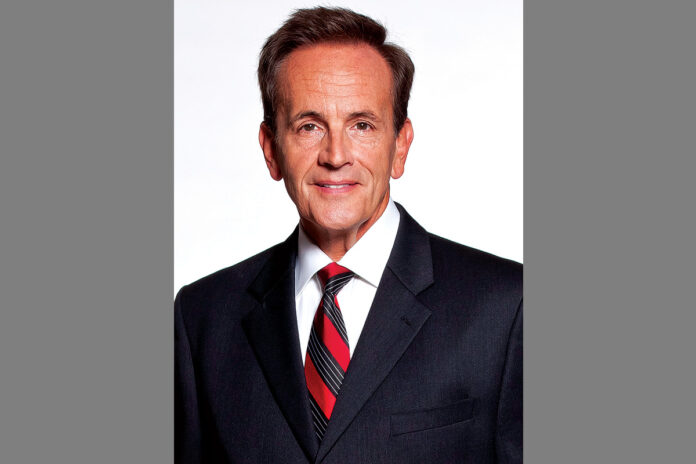In May 1980 local television viewers got their initial look at Keith Humphry when he first signed on as a newscaster at Roanoke’s WDBJ-7, then located at Towers Shopping Center on Colonial Avenue. Formerly a public television news director in Wilmington, Delaware, Humphrey had gotten the job at News 7 after meeting the station’s news director at a broadcasters’ convention in Las Vegas a few years earlier. Sometime later, the director called Humphry and said, “Come down here, and talk to me about a job.”
Thirty-one years later, Humphry is leaving the News 7 anchor chair (on May 27) he shares with co-anchor Jean Jahon for a well-deserved retirement. As to why he has remained with WDBJ for so long, Humphry says, “It’s hard to describe what has kept me here. There’s been a lot of good reasons to stay.” One reason is that the station is a non-public business owned by the Schurz family in Indiana—meaning WDBJ is accountable to no one but the Schurz family. “As long as the Schurz family is happy,” says Humphry, “people are happy. So it’s been a good place to work.”
Explaining why he never sought to become a national network correspondent, Humphry explains, “I got accustomed to sleeping in my own bed, and living in a place that I liked a lot. As much as I like to travel, I don’t like to travel on somebody else’s schedule. And so it just never happened.” There was one occasion during his tenure at News 7 when Humphry actually accepted a job in Orlando, and notified WDBJ that he was leaving, “and the boss talked me out of it. Nobody’s offered me a job since!”
Over the years, Humphry has done several stories that carried the possibility of risk to WDBJ and himself. One involved unethical business conduct on the part of a local car dealership—a highly sensitive matter to the station at the time as car dealerships were its principal clients. In this particular instance, the dealership was selling wrecked vehicles as though they were new—going so far as to roll back the mileage readings on them and selling the vehicles with the damages. “It was really an egregious case of wrongdoing,” recalls Humphry, “but it was a major client and nobody ever said, ‘we’re not going to run that story.’” Not surprisingly, the guilty parties pulled their advertising from the station but eventually returned.
Another instance involved an individual in the health care business who, highly displeased with a story, protested unsuccessfully to the station manager and a member of the Schurz family to kill it. “I only heard about this after the fact,” says Humphry. “The story ran. Nobody ever said anything to me about it. Later I learned that this person had (done) everything short of calling God. It didn’t stop the story.” Humphry feels those kinds of days are likely not the same anymore, yet notes that more recently he’s done stories “that caused some concern in the front office – but nobody ever came back here and got their face in my business. It was strictly between me and the news director and whether it was news.”
Another memorable story Humphry covered was the Haysom murder trial involving Elizabeth Haysom and Jens Soering. In that instance, Humphry traveled to England as part of his coverage of the trial. “It made sense to go, though I doubt any local reporter would be dispatched there under similar circumstances now. We’d rely on feeds and stringers to do the job for us today. There’s nothing like the perspective of a reporter who knows the inside story, though and one who has an interest in getting to the bottom of it, rather relying on the kind of drive-by court coverage that I see elsewhere.”
While he feels that “appointment television” (regularly scheduled newscasts) are waning, Humphry believes that viewer still want good, long-form television programs—as witness the great popularity of programs such as “60 Minutes.” Humphry is also disturbed by what he sees as television journalism’s emphasis on personalities—citing Katie Couric’s tenure on the “CBS Evening News” as an example. “Katie Couric [leaving CBS in June] was hired because she was a popular personality on The Today Show. I’m not a big fan of her as a news reader. I don’t think she does it very well. There’s a lot of things she does very well. Interviewing is chief among them. But the fact is they’ve held her up as a personality and it hasn’t brought the ratings [up] to what they would like.”
Humphry cites various reasons for his decision to step down at this time. His contract is up, and he feels the time has come for him to do something else. Moreover, he is less than pleased with the News 7 organization’s growing emphasis on directing people to the Internet and social media such as Facebook. “I don’t have any argument with that but it’s not why I got into the business. I got into the business because I like the process of telling news on television. I’ll be 62 when I retire. I’m going to teach in the fall. I’m going to teach a course at Hollins University in broadcast writing, and I’m looking forward to that. I’m looking forward to doing something different.”



